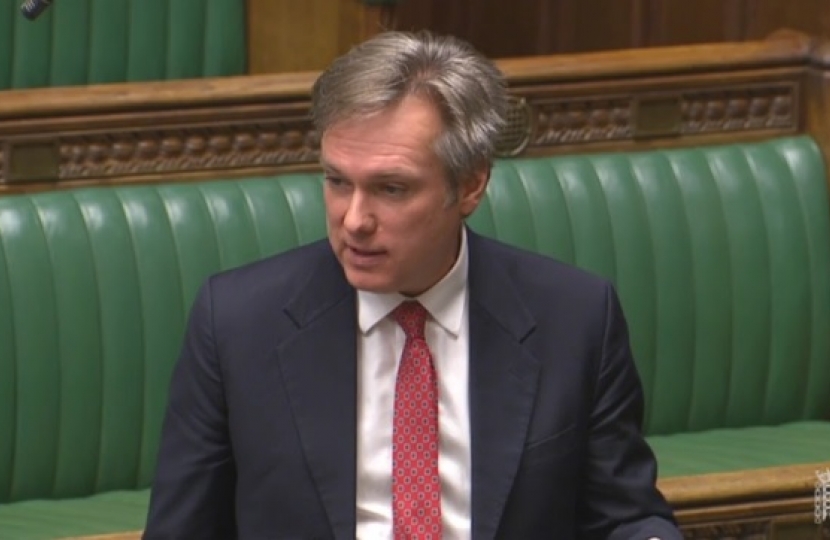
Henry Smith MP has spoken in the House of Commons (Thursday, 1st December) to condemn further strike action planned by the RMT and ASLEF unions affecting Southern and Thameslink passengers, and has called for a parliamentary debate on this issue.
The Crawley MP raised this matter with the Leader of the House of Commons after almost missing the opportunity to ask an earlier question to the Exiting the European Union Secretary following Southern Railway delays this morning.
This follows a debate Henry secured and led in the Commons on Govia Thameslink Railway services on 13th September 2016.
Henry said;
“Like many other Crawley commuters who travel by rail, and through no fault of our own, I was late for work again today. Despite allowing plenty of time, I just about managed to make it into the chamber to ask the Exiting the European Union Secretary a parliamentary question I was on the Order Paper to ask, thanks to the discretion of the Speaker.
“We’ve all seen how Govia Thameslink Railway have been underperforming for the last year or so now – and it’s right that my parliamentary colleagues and I continue to hold them – and the Department for Transport – to account.
“I’ve seen for myself how the service has deteriorated even further this week – I’ve urgently spoken with the Transport Secretary yesterday and on Tuesday, and I look forward to the next meeting of the cross-party group on Southern Rail next week.
“But the actions of the RMT and ASLEF unions must also be brought to bear. Their continuing and opportunistic strike action only makes our journeys and commutes worse. Starting on Tuesday 6th December, the RMT are commencing yet another three day strike. As well as their own strike the following week, as of next Tuesday, ASLEF workers will not be providing overtime cover.
“There can be no doubt that this industrial action programme is politically motivated. The Transport Secretary has confirmed that while ASLEF have already accepted the introduction of Driver Controlled Operation on the Brighton main line, they are simply objecting to its introduction on key routes that feed into it.
“More than 60 per cent of trains elsewhere on the Govia Thameslink Railway network are currently operating in this way.
“It’s beyond clear that the rail unions have an agenda to cause as much disruption as possible. RMT strike action has been deliberately timed to cause disruption for Bonfire Night, Christmas holidays, and New Year celebrations.
“I’m well aware that this disruption goes beyond people’s working times – early starts and late finishes are depriving parents, for example, of those precious hours at the start and end of the day where they can see their kids, whether to help with homework, play together, or sit down and eat dinner as a family.
“In October, Crawley Borough Council debated the RMT action, and shamefully Labour members voted against the Conservative motion to condemn this disruption.
“While they may wish to let the unions off the hook, I’ll continue working with colleagues on all sides of the House of Commons, not least as part of the Southern Rail All-Party Parliamentary Group, in holding the Government, the unions and the operator to account.”
Henry Smith, Member of Parliament for Crawley, asked the Leader of the House of Commons;
“Like right hon. and hon. Members on both sides the House, I am always very grateful to you, Mr Speaker, for your generosity, understanding and forbearance, as was evidenced earlier when you allowed me, although I was late, to ask a question on exiting the European Union.
“Not for the first time, and despite allowing plenty of time, I have been late for business in the House this week because of problems with Southern railway and Network Rail.
“May we have a debate on the unnecessary industrial action by the RMT and ASLEF unions, which has been making many of my constituents and people across the south-east late for work and late getting home again to see their families for almost 12 months?”
The Leader of the House of Commons, Rt Hon David Lidington MP, responded;
“My hon. Friend speaks on behalf of a large number of hard-working men and women whose lives are regularly being disrupted in the way in which he describes.
“Positive industrial relations should be part of the backbone of a productive economy, but that needs to involve people being able to go about their business and to get on with their lives without unjustified disruption.
“Of course trade unions can and do play a constructive role, but we did need to introduce modernising reforms to ensure that strikes such as those that my hon. Friend describes happen only as a result of a clear positive decision by union members entitled to vote.
“Under the Trade Union Act 2016, we have provided for a 50 per cent turnout threshold for all industrial action ballots and an additional 40 per cent support threshold for key public services. We will shortly bring forward the secondary legislation to implement those reforms. That is evidence of the Government’s determination to tackle the problem.”
